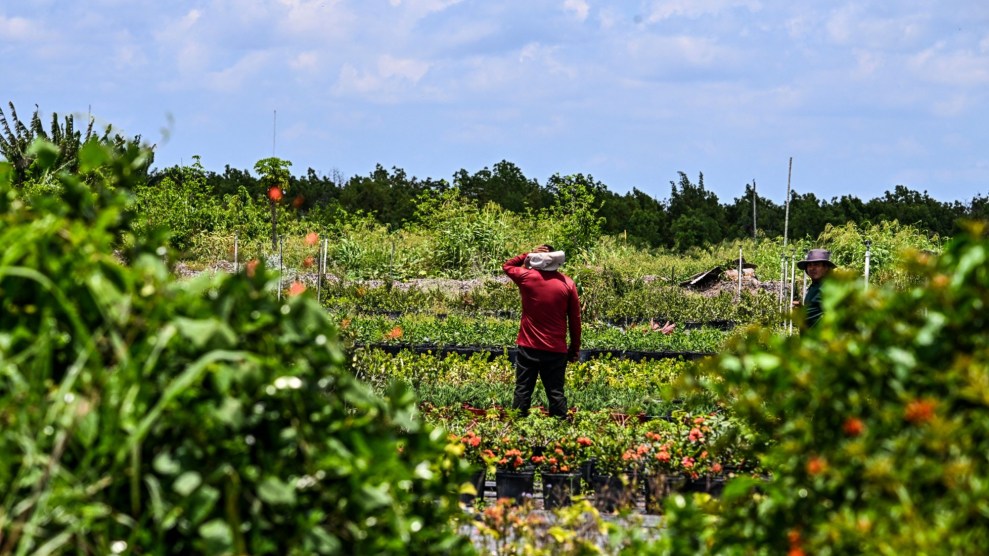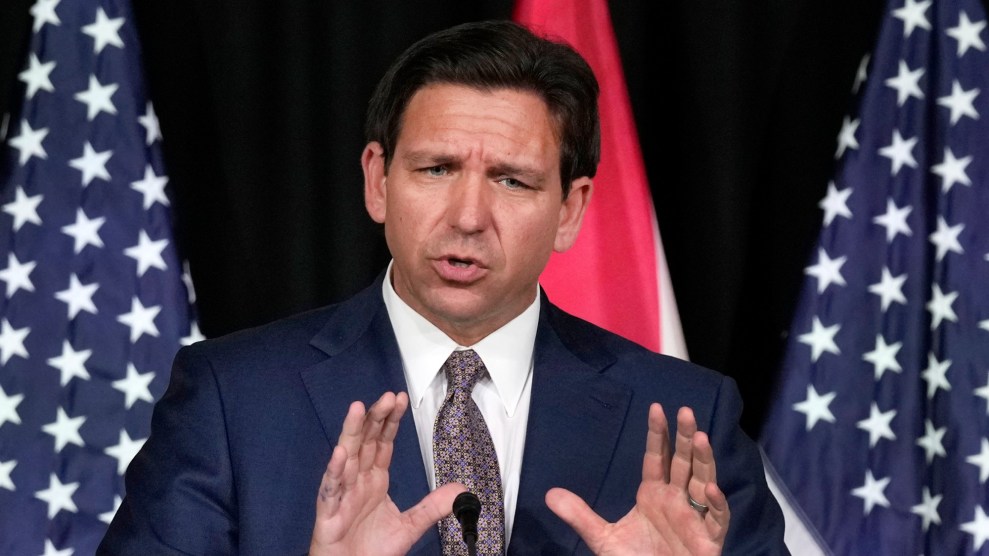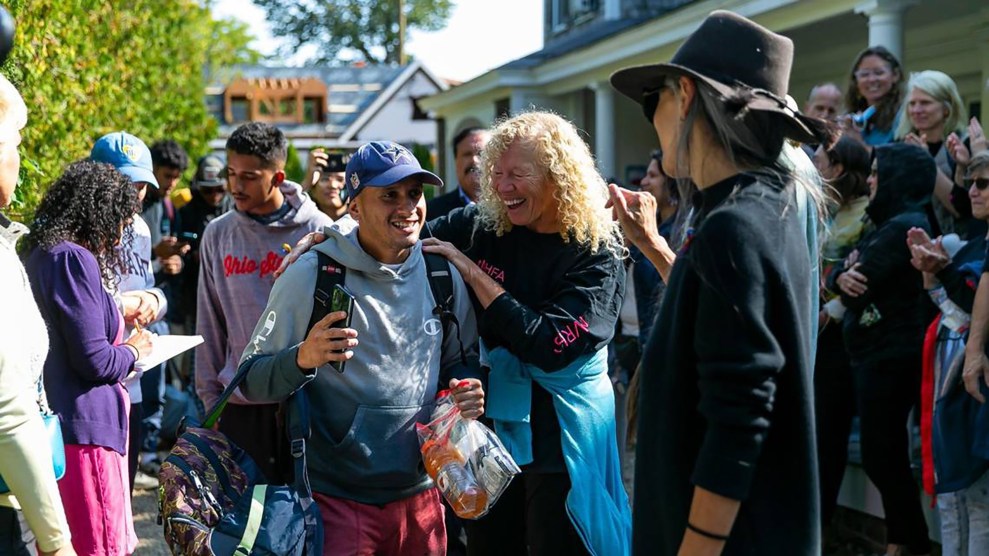
Chandan Khanna/AFP/Getty
Guadalupe de la Cruz, director of the Florida chapter of the American Friends Service Committee (AFSC), wasn’t surprised when Gov. Ron DeSantis signed one of the most restrictive anti-immigration laws in the country this May. After all, DeSantis already championed legislation banning sanctuary cities in the state and engineered political stunts with flights of migrants from Texas to Martha’s Vineyard. These policies intentionally created to target the immigrant community, de la Cruz says, are part of “a pattern we’ve seen before.” Nonetheless, she adds, this new measure brings discrimination against immigrants to a different level. “It was still very disappointing to have a governor support such a racist, anti-immigrant law,” she says.
On May 10, when DeSantis signed Senate Bill 1718 into law, he claimed to be “fighting back against reckless federal government policies and ensuring the Florida taxpayers are not footing the bill for illegal immigration.” The sweeping legislation mandates that private employers with more than 25 employees use the federal E-Verify system to check the immigration status of new hires; failure to comply could risk penalties that include the revocation of licenses that are required for businesses to operate.
Under the new legislation, local governments will be prohibited from providing funds to issue identification documents for undocumented immigrants and immigrants will be barred from using legally issued driver licenses from other states. (Currently, 18 states, Washington, DC, and Puerto Rico allow undocumented immigrants to obtain driver’s licenses.) Hospitals that accept Medicaid now will be required to collect immigration data on their admission or registration forms and report costs associated with any treatment of patients. The transportation of undocumented immigrants across state lines into Florida becomes a felony—punishable by up to 15 years in prison if the immigrant is a minor. Meanwhile, $12 million will be allocated to the governor’s so-called “Unauthorized Alien Transport Program” to move migrants to other states as a way to criticize the Biden administration’s supposedly “open border” policies.
In Florida, about one in five residents are immigrants and hundreds of thousands of US citizens live in mixed-status households. An estimated 900,000 people lack lawful status in the Sunshine State, which ranks among the top five states hosting undocumented agricultural workers. Without undocumented workers, the Florida Policy Institute projects, the industries that employ most undocumented workers—including construction, agriculture, retail, and hospitality—”would lose 10 percent of their workforce and the wages they contribute along with them.” In one year, the state’s GDP could drop by $12.6 billion.
The law won’t go into effect until July 1, but De la Cruz says it has already produced a chilling effect, with community members unsure of whether it’s safe to go to work or take their children to school. The group has engaged lawyers to draft notarized letters for parents and guardians in case something were to happen to them. “The bill has caused a lot of panic and chaos,” she says. “Many of our community members are either leaving Florida or considering it.” Should they decide to leave, they often ask what other states might be safe for them.
Reacting to an Axios article about undocumented immigrants leaving the state, Christina Pushaw, a spokesperson for the governor’s office, tweeted: “So what you’re saying is… the law is working? Good.”
The American Civil Liberties Union of Florida denounced the bill as “cruel, dangerous and overbroad.” In a statement, the group’s political director Kirk Bailey said the measure “represents government overreach and an abuse of power, criminalizes and racially profiles Floridians, hurts our economy, and misuses millions of taxpayer dollars to actively attack Floridians.” The League of United Latin American Citizens (LULAC), the country’s oldest Latino civil rights organization, issued a travel advisory, warning potential visitors to be “cautious.” The Florida Immigrant Coalition, a statewide 65-member coalition composed of nonprofits, labor unions, and faith-based organizations, has also warned “people of color, LGBTQIA+ communities and individuals who speak with an accent, and international travelers” that “traveling to Florida is dangerous.” The group recommended a safety plan that includes memorizing a lawyer’s phone number and making preliminary arrangements for “care/custody of children, pets, property, and personal belongings.”
For Renata Bozzetto, deputy director of the Florida Immigrant Coalition, SB 1718 is “unprecedented” in scope. “Those practices are creating exacerbated fear,” she says, “and making our communities less safe.“ Bozzetto has seen an uptick in calls to the community hotline and messages through social media channels. “We’re seeing not only reports of people leaving but also that they have already left,” she says, explaining that a likely ripple effect is a worsening housing affordability crisis. “Individuals who used to sublet a room or co-habit with other families have walked out and that creates a true issue for those who have to uproot their families but also for those who stay behind”—and must cope with higher costs absent the additional rent.
Florida’s new legislation echoes anti-immigration laws previously enacted in states such as Arizona—with the infamous “show me your papers” law SB 1070—Georgia, and Alabama. In 2011, Alabama Gov. Robert J. Bentley signed into law a bill described by its sponsor as designed to attack “every aspect of an illegal alien’s life.” Among other things, it required school officials to check the immigration status of students and made it a crime to give a ride or rent an apartment to undocumented immigrants. The law, which had key provisions struck down as part of an agreement between the state and civil rights groups, produced such a chilling effect that Latino immigrant families pulled children out of public schools and workers were driven out of their jobs, resulting in a workforce exodus. A study conducted by an economist at the University of Alabama at the time estimated the crackdown on immigrants would shrink the state’s GDP by up to $10.8 billion annually as a result of lost earnings and consumer spending, on top of diminished tax revenue.
Gina Fraga, an immigration lawyer in Palm Beach, recently spoke about the new law to approximately 200 people gathered at a church. “The look on their faces is sheer panic,” she says. “They don’t know what to do.” Fraga says she has already heard of clients receiving notices from bosses terminating their employment. She has also talked to business owners at pool companies, landscaping, constructing, and staffing agencies, who are worried about what this law will mean for them. Companies that once transported seasonal migrant farmworkers back from North Carolina or Georgia could risk their drivers going to jail. “Industries are going to be affected,” she says. “Floridians are going to see an increase in prices of food and veggies.”
Videos of empty fields and construction sites have gone viral on social media and truckers have called for a boycott of shipments to Florida. “Remember one thing, in Florida, more goes in than comes out,” a Cuban driver said on TikTok, “So if we don’t take anything to Florida, tell me, what are they going to have? Let’s see what the governor is going to do. Is his little truck going to take things to [the] lousy racist people he has there?”
“This is just the tip of an iceberg that is much more dangerous,” Bozzetto says. “It’s an attack on our systems of trust, of neighborly everyday interactions—on our democracy.”
















